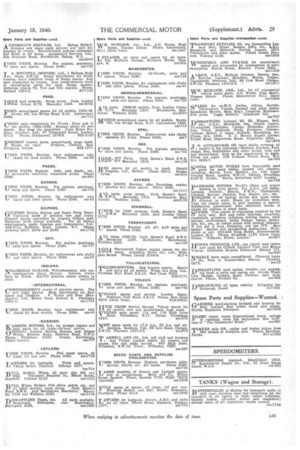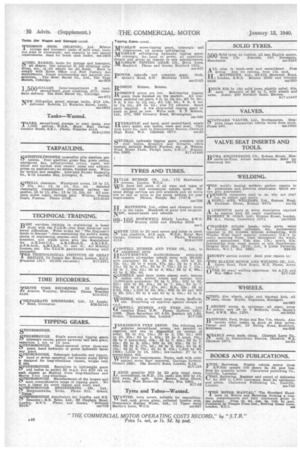The Promotion of Our Export Trade
Page 55

Page 56

If you've noticed an error in this article please click here to report it so we can fix it.
By the Rt. Hon. R. S. Hudson, M.P., Secretary of the Department of Overseas Trade
THE official trade returns show that during recent months there, has been a steady, even if modest, increase in the value of our exports. It is to be hoped that with an improvement in the conditions prevailing in the United States, which exercise a potent influence on world conditions generally, and with the increased opportunities for mutual trade afforded by the Anglo-American Trade Agreement, there will be a still further upward movement in the value and volume of our general exports.,.
Export Growth Continues.
In any process of recovery the motor industry is destined. I am sure, to play an important role. Its success in the home market is apparent on every road, whilst in the export trade it has in recent )...ears shown marked progress. Even during the past year, when economic difficulties have been accentuated by widespread political disturbances, the industry has succeeded in securing a small increase in its overseas trade.
This is a striking achievement, the more striking because this increase, small though it be, follows close upon a rapid growth of exports of commercial motor vehicles and chassis from £1,770,000 in 1933 to £3,830000 in 1937.
I wish that all our export industries could show a
similar increase of trade. Unfortunately some are faced with peculiar difficulties, such as those which arise from the increase of local manufacture abroad, or from intense competition based on low wages costs. It follows that a special responsibility falls on some of the newer industries to obtain a growing volume of export trade ; in thus securing, their own prosperity they will also serve a vitql national need.
International trade is, to-day, beset by many obstacles, the chief of which .is, without doubt,. the feeling of uncertainty and lack of confidence born of the political situation. The past year has been one of crisis and of foreboding. Much has been done, and is still being done, in our efforts to relax political tension.
My most heartfelt New Year's wish is that the policy of His Majesty's Government, aiming at the re-establishment of happier political relations with other countries, will bear the fruit that it deserves to do and that it will succeed in restoring the general atmosphere of confidence so essen tial to the steady expansion of international exchange of goods and services.
Credit Scheme Helping.
In the field of economics His Majesty's Government has not been idle. I have referred already to the Anglo-American Trade Agreement. Another important step which has recently been taken is the extension of the facilities available under the Export Credits Guarantee Scheme. The very rapid growth in the use made of these facilities is clear evidence of their utility in enabling traders to meet, at any rate in some measure, the credit and transfer difficulties which hamper trade in many markets.
A further step, calculated to make for greater success in export trade is one that I commend to the consideration of all exporting industries, not least the motor industry, for it is one which lies within their power to take, viz.: the planning of co-ordinated action, along such lines as the particular circumstances of each industry may suggest, in order to meet the growing severity of highly organized foreign competition.
There can be no doubt that the increase of organized effort to secure export trade exerted by some of our foreign competitors makes it imperative that our industries should show a similar readiness to reconsider existing methods, and that exporters should consider how their joint efforts can be directed to attaining the maximum return for their activities in markets overseas.
The Marketing Boards' Squeeze
THE leading article in our issue of December 23 appears to have aroused the ire of two at least of the many marketing boards which so cleverly govern the agricultural industry of this country. Apparently they resent any suggestion that they are not equally as capable of governing any other department of industry, not excluding even that of road haulage. The Pig Marketing Board has squealed, also the Milk Marketing Board has expressed its annoyance at our attempts to interfere in what it clearly regards as its own business.
We are unrepentant. Moreover, we return to the subject and have considerable justification for doing so. Since that article appeared evidence has been produced to us to show that the example of harsh treatment by the Milk Marketing Board, quoted in that article, is not, as we considered might be the case, a sporadic attempt in a particular area to squeeze the haulier. It was not even, as was suggested to us, the thin end of the wedge, a "try-on," to use a popular term, to be used subsequently, if successful, as a precedent to justify reductions in milk haulage rates in other districts. It is apparently part of a widespread scheme to cut those rates throughout the country.
Interference Not Requested or Desired.
A peculiar and significant feature, common to all these cases of interference by the Board, is that the interference is neither asked for nor desired by any of the three parties really concerned in the business. The milk producers are satisfied to pay current rates; the proprietors of the dairies or factories to which the milk is being delivered, are also satisfied. The hauliers are reasonably content, in that whilst the profit they make is meagre the work, even if it does fluctuate according to season, gives all-the-year-round employment to their vehicles, and on that account is assuredly welcome.
In every instance, wherever, we have investi gated the matter, this condition prevails. The interference with current conditions is purely gratuitous on the part of the Milk Marketing Board and its recommendations for reductions are made without any regard whatever to the economic aspect, at least so far as the interest of the haulage contractor is concerned. It is obviously designed to enable the Milk Board, at some later date, to be able to curry favour with the farmers and other parties concerned so that the Board can, in fact, claim to have effected reductions in cost of distribution and have that fact recorded to its ultimate credit by those parties.
It may even be that some dictatorial scheme, similar to that which has just been thrown out by the House of Commons, may be in the mind of the Board, which is paving its way to more favourable reception on the next occasion when it approaches the House.
"The price of a commodity is what it will fetch" is a plain, businesslike statement of what ci8 is undoubtedly a law of economics. The average haulage contractor may not have heard the statement in just those words. He is, however, well acquainted with the effect of the law which they so _tersely define. He is up against it every day in his dealings with his customers. Certainly, amongst all the haulier's customers, none is keener or more energetic in ensuring that the price which he pays for his commodity is a minimum, than the farmer or the man who buys from the farmer.
Present Rates Give Only Small Profit.
In dealing with these customers the haulage contractor must make the utmost use Of his wit and business acumen to ensure that he obtains even a minimum profit It is hardly fair that, when he has reached agreement with the parties concerned the terms should be upset at the dictation of a Government department; one which, whilst it may be expert in the production of milk, has no justification whatever for the assumption that it is equally expert in the economics of road haulage. At least, if the department was in the slightest degree acquainted with the current condition of affairs in the road-haulage industry it would never for one moment put forward as having any justification a suggestion that a cut of 25 per cent, should be made in current rates.
Anyone with even the vaguest idea of the relation between turnover and net profit in the haulage industry to-day must be fully aware that there is hardly a vehicle on the road that is carrying traffic which could stand a reduction of half that proportion and continue to operate at any profit at all.
Is This a Tractor Era?
THERE are definite signs that the tractor is at last coming into its own, if one may judge by the bold displays at the Smithfield Show, a report of which appeared in our issue of December 9. New models and new types indicate a freshening of interest and are indicative of the makers' endeavours to meet current demands and to open fresh markets.
When a farmer decides to make a change from horses to mechanical means for ,cultivating, he needs convincing on important issues such as practicability and economy, and whilst in the case of the fanner with hundreds of acres under the plough the answer is one of simple arithmetic, it is not quite the same thing with the small farmer.
This man probably reasons it out that he cannot find sufficient work for a tractor to justify the initial outlay, quite overlooking the universal application of this source of power. There is practically no limit to its uses, as the modern machine is adapted for every conceivable use where the need for mechanical power shows itself.
Exhibitors at the Smithfield Show have made a bold bid to meet every likely demand, and from inquiries made it would seem that their efforts were rewarded with something more than mild interest.




















































































































































